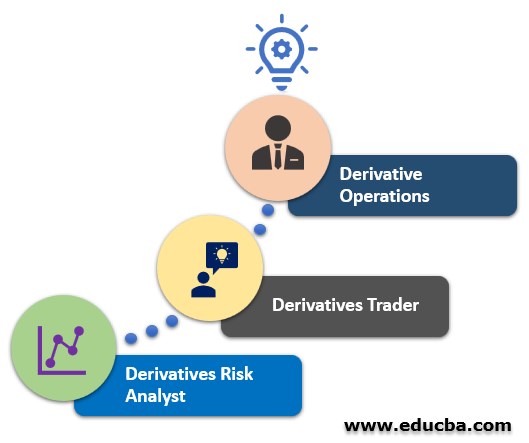Updated July 11, 2023
Introduction to Derivatives Career
The term “derivatives” refers to complex financial instruments whose value is derived based on their underlying asset. These instruments are usually associated with ultra-high-value transactions across global financial markets.
Some primary examples of derivative instruments include Options, Futures, Swaps, and Forex. A career in the derivatives market will require you to delve deep into complex financial transactions as it involves a matrix of highly interweaved networks of global markets.
Explanation
The derivatives market is a huge industry globally and, as such, a great employment generator that has also been responsible for promoting growth in the overall financial domain, even in cases where the banking industry has failed. This article will discuss some of the most sought-after career paths or job profiles in the derivatives industry that you can pursue. The job profiles are:
- Derivative Operations Analyst
- Derivatives Trader
- Derivatives Risk Analyst
Top 3 Careers Options in Derivatives
Below are the top3 careers options for derivatives.”
1. Derivative Operations Analyst
As a derivative operations analyst, you will be responsible for compiling and analyzing data required for supporting the front office team engaged in derivative hedging.
Responsibilities:
The major responsibilities of derivative operations analysts include the following:
- Assisting and supporting the processing of derivative lifecycle dealings for different types of products
- Managing collateral/margin of over-the-counter (OTC) products
- Monitoring movement in margins for Futures and Cleared accounts
- Evaluating and analyzing daily mark-to-market (MTM) valuations for derivative positions across brokers
- Coordinating and performing reconciliation of derivatives position
- Executing and analyzing the legal documents about trading agreements
- Preparing periodic reports
- Maintaining timely communication of updates to the senior management and other stakeholders.
Educational, Skill, and Experience Requirement:
A derivative operations analyst should have the following education, skill level, and professional background:
- A bachelor’s degree in accounting, finance, business administration, or another related discipline
- Sound knowledge of derivative instruments along with an understanding of the basic investments and financial market
- Strong interpersonal, organizational, and problem-solving skills
- Working knowledge of Advanced Excel skills, Macros, and VBA
- Recommended qualifications that are preferable include CFA and FRM
Salary:
In the US, the median annual salary of derivative operations analysts is around $62,093, with the highest 10 % earning more than $100,005 while the bottom 10% earning less than $33,447.
Link: Derivative Operations Analyst Salary
2. Derivatives Trader
As a derivatives trader, you will handle different products in fixed income, commodities, and equities.
Responsibilities:
The major responsibilities of derivatives traders include:
- Executing trades for fixed income and commodity futures, equity index options, interest rate swaps, total return swaps, and other credit derivatives.
- Managing a portfolio that includes researching and creating customized strategies
- Implementing improvements in trading practices, portfolio analysis, and performance reporting
- Executing settlement of derivatives with different brokers ensuring accuracy in cash flows of trades and holdings
- Collaborating with brokers, custodians, derivative front office, etc., ensuring timely and efficient execution of position breaks and trade settlements
- Preparing various performance-related reports
Educational, Skill, and Experience Requirement:
The derivatives trader should have the following education, skill level, and professional background:
- A bachelor’s degree in finance, mathematics, economics, or other related fields
- More than five years of experience in trading derivative products
- Sound knowledge of fixed-income futures, OTC products, and commodities
- Thorough understanding of how the financial market works and technical issues that might emanate from derivative trading
- Working knowledge of programming in VBA, C#, R, and SQL is preferable
- Working knowledge of Bloomberg and MS Office
- An eye for detail, along with the ability to work in a team
- Recommended qualifications that are preferable include CFA, CPA, and FRM
Salary:
In the US, the median annual salary of derivatives traders is around $99,337, with the highest 10 % earning more than $152,000 while the bottom 10% earning less than $47,000.
Link: Derivatives Trader Salary
3. Derivatives Risk Analyst
As a derivatives risk analyst, you will formulate and articulate a company’s perspective on different types of fixed-income strategies, yield curve positioning, macro-economic, etc.
Responsibilities:
The major responsibilities of derivatives risk analysts include:
- Working in a close circle with the trading team to develop a sound understanding of their operation and strategies
- Computing Greeks and other sensitivity measures for different risk factors
- Building and monitoring stress tests to keep a check on various regulatory metrics, such as Value at Risk (VaR)
- Monitoring risk limit consumption and following up on breaches with the front office team
- Certifying the Profit & Loss (P&L) of the trading desk
- Publishing commentary on daily and monthly P&L that is communicated to the senior management
- Liaising with other departments for work on regulatory projects
- Creating daily and weekly dashboards for monitoring the trading activities in a better way
Educational, Skill, and Experience Requirement:
A derivatives risk analyst should have the following education, skill level, and professional background:
- A master’s degree in finance or financial engineering
- Relevant work experience with sound knowledge of P&L metrics and fixed income or equity risk
- Pro-active, eye for detail, desire to work in a fast learning environment
- Strong written and verbal communication skills
- Solid interpersonal skills
- Sound understanding of various financial market instruments
- Strong mathematical and analytical skills
- Proficiency in programming languages, such as VBA, SQL, Python, etc.
- Recommended qualifications that are preferable include CFA, IRM, and FRM.
Salary:
In the US, the median annual salary of derivatives risk analysts is around $63,829, with the highest 10 % earning more than $94,000 while the bottom 10% earning less than $46,000.
Link: Derivatives Risk Analyst Salary
Conclusion – Derivatives Career
So, it can be concluded that a career in the derivatives industry requires a lot of hard work and knowledge. As a result, a career in the derivatives market can be very demanding, but the higher pay well compensates for what it offers.
Recommended Articles
This is a guide to a Derivatives Career. Here we discuss the 3 Options for a career in derivatives with knowing responsibility, qualification, and average salary. You can also go through our other related articles to learn more –




